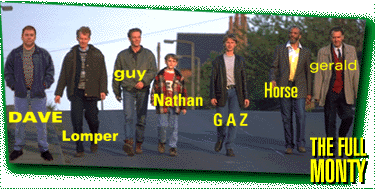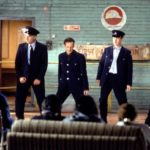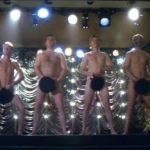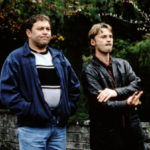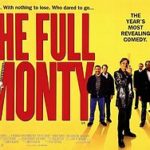One of my more auspicious stage appearances required me to be naked. The play was a Ray Cooney farce called Out Of Order, though it did not require a full striptease act. When friends and family learned I was doing this role, they thought I was brave, but nonetheless, at the end of the run I felt totally blasé about being naked in front of 300 people who had paid good money to be entertained. There is something quite liberating about the experience. In just the same way, there is something quite liberating about this movie.
The surprise hit of 1997, The Full Monty was the spunky British working class comedy success-from-adversity from the school that made politically-edged hits of the likes of Rita, Sue and Bob Too, Brassed Off, Made In Dagenham, Kinky Boots and even edgier ventures like Trainspotting – not to mention one possible source of inspiration for Magic Mike over in the States. Put another way, these films are the antidote to comedies of wealth like Peter’s Friends, Four Weddings And A Funeral and Notting Hill.
Go back to the 30s, 40s, 50s and 60s and there were different generations of working class comedies for the masses – in fact you can go back to the likes of Norman Wisdom and George Formby as fine exponents of the art of cheering the man in the street in their day, particularly in the wartime era and the hardships beyond. The working man and woman could identify with the themes displayed, where the cultured would probably consider the Full Monty vulgar and beneath their dignity – making ordinary life against the odds the theme of archetypal British comedy with class overtones.
Since those glory days, the genre has been reinvented in every recessionary era, and so it was in Sheffield after the steel mills closed. The theme is familiar: ordinary blokes struggling to survive and keep their families together (albeit now divorced families with estranged kids), find an outlet and finally win against the odds. What sets the late 90s apart from earlier generations was grittier approach with language of the streets; times change.
The plot is actually pretty light, in-keeping with a strict 90-minute time slot, so this is primarily character-driven comedy, an extended sitcom if you like. But those factors are what sets TFM apart and made it such a roaring success, and they are not hard to spot.
Director Peter Cattaneo did a fine job in making this a film easy to like, whether or not you agree with the underhand and occasionally desperate morals of the men impacted by the closures – but it is that hint of desperation that leads the men to try stripping, and unless you have one side you could not find the other credible.
That we meet the character Lomper (Steve Huison) as he is trying to commit suicide by gassing himself says something, but never have I seen suicide treated so lightly as a subject, though equally I know of nobody offended by that scene.
Simon Beaufoy‘s sparky script, beautifully worked characters acted by quality performers – and the cheeky hint of nudity probably helped too. Women might be attracted by the Chippendale-style striptease (where at one time stripping was confined to women and watched by men), while men like the knockabout banter shared by the men, led by Robert Carlyle.
Carlyle has made a career playing a spectrum of recognisable characters, from the thuggish psychopath Begbie in Trainspotting to an accidental serial killer in The Legend Of Barney Thomson – with a Bond villain along the way for good measure. The latter notwithstanding, there is definitely something of the working class hero about Carlyle, undoubtedly the star of the Full Monty show.
The stripping ensemble also includes renowned character actors like Tom Wilkinson, who always does a fine job – even as an American corporate CEO in Duplicity; Mark Addy, who appeared in regal robes in Game Of Thrones; Steve Huison (the pigeon-chested buglist and would-be suicide), Paul Barber (the black Scouse one with all the best dancing ) and Hugo Speer (the one with the six pack and allegedly a huge penis), plus William Snape as Carlyle’s Gaz’s son Nathan. The guys are matched with feisty intent by their women, including Mike Leigh stalwart Lesley Sharp.
As a team they perform way better than you have any right to expect, be it as dancers, strippers or just ordinary blokes. The music helps, focusing on Donna Summer‘s catchy disco classic Hot Stuff, may she rest in peace.
The funniest moment? Has to be the 1972 American-style travelogue over which the opening titles are displayed, selling Sheffield to an unsuspecting world – and then the contrasting view of a city in crisis 25 years on. I suspect many such juxtapositions have caused ribaldry over the years. Remember Peter Sellers’ infamous Balham, gateway to the South?
In hindsight, this is a slight movie but enjoyable nonetheless. It has stood the test of time remarkably well, aided perhaps by the regular recessions blighting our country and the world, and the fact that working people are the ones who seem to suffer most.

